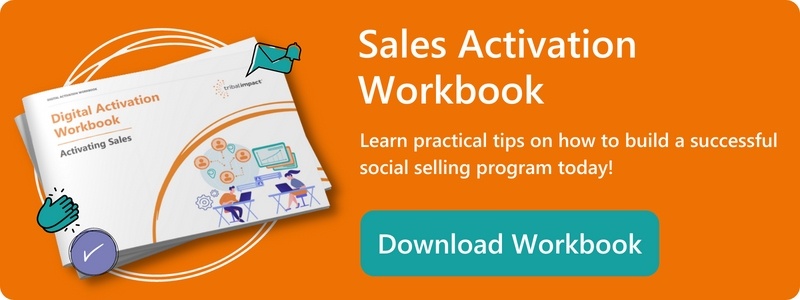Many organisations are at the start of their journey from siloed social campaigns to a social-first business. An external partner can help you accelerate your transformation with specialist resources, expertise and best practice. But with so many social trainers and agencies available, how do you choose the right partner for your business?
It’s something that Ericsson’s Global Head of Social Engagement & Advocacy, Anita Veszeli has experienced first-hand. Ericsson has achieved Leader status in Hootsuite’s Social Media Maturity Benchmark, but it’s not necessarily been an easy journey.
As Anita says in her LinkedIn article, “How do you piece together a social-first business?”:
“Creating a social-first business - with social media built into your company’s DNA – is like piecing together a really tricky jigsaw.”
Ericsson chose to work with Tribal to speed up their journey; you can hear more about their approach here.
If you’re thinking now is the time to work with an external partner to drive your social business transformation forward, there are many elements to consider. And in carefully evaluating potential partners in each of these areas, you can rest assured that you’ve selected the right partner.
Blended Learning
Effective training is critical to the success of a social transformation program and blended learning should lie at the heart of the revolutionary change needed in corporate learning, according to McKinsey.
Every employee is different. Each has their own unique goals, personality, motivations, knowledge and experience using social media. Consider the learning formats offered by vendors - do they work for different goals and unique learning needs?
Train The Masses
eLearning has grown phenomenally in popularity and COVID-19 has accelerated this further. 82% of senior stakeholders and 71% of users now demand more digital learning in the wake of the pandemic, according to Fosway Group’s research.
eLearning is the ideal platform for rolling out social business training to the masses. It's self-paced, accessible on-the-go to end-users and budget-friendly.
Train The Many
Training the many involves targeted advanced training for selected groups of people. There are 9 stages of social media maturity and many employees will need advanced content to help them continue their social journey.
At this stage, webinars and workshops are the most useful. Webinars can help you deliver advanced and targeted training, taking learners through the best practice for advanced techniques. Live chat, polls and break-out room features can make webinars interactive and engaging.
Workshops are more hands-on, with learners usually breaking into groups to implement their knowledge together and gain real-time feedback. Webinars can reach more people than the typical 16-person limit of workshops, so it’s best to use both in any learning strategy.
Train The Few
Training the few means delivering very targeted learning for specific individuals. For example, you may want to help your Social Champions connect with specific external influencers or target their own key accounts. It all depends on what their aspirations and goals are.
This is where 121 coaching is most helpful. Coaching gives employees the chance to ask questions specific to their needs and sense-check what they are doing in real-time.
The Ability To Scale

At some point, your business will reach the stage where you need to scale your program across the enterprise.
For the masses, eLearning courses help you scale quickly. When eLearning is designed well, learners can focus on how to complete specific tasks that are relevant to their jobs. eLearning also acts as a helpful resource when they need to perform a newly-learned skill in real-life. Learning should move from courses to resources, as Nick Shackleton-Jones says in HR Magazine. With eLearning, you can also quickly measure how people are engaging – or not – your partner should be able to adapt for specific user groups promptly.
When training the many or the few, your ultimate goal should be to build an internal team of trainers or coaches that can deliver your social business transformation at scale. Your partner should work closely with you to select the right people and help you train and coach your team on how to deliver this. And with social best practices and tool features changing so rapidly, they should help you ensure that your team are always up-to-speed with what’s working now and exchanging best practice wins (and fails, too).
Up Close And Personal
If social media is to become part of your DNA, then your social transformation partner needs to understand your business truly. This starts by understanding where you are starting from:
- How do you track sales currently?
- What are your existing business processes?
- Where are different employees at in the 9 stages of the social media maturity journey?
- What’s worked successfully – or not - for change projects in the past?
Then the conversation should move where you want to be (and the unique challenges you may face).
- What are your goals and KPIs?
- What threats and opportunities keep leadership and managers up at night?
- What tools, tech and systems do you need to work within?
- What audiences are you targeting – down to the specific accounts (and the people within in) or influencers.
- What keywords do you need to target and how will you do so?
A true partner takes that knowledge to offer much more than a one-size-fits-all approach to your program. It goes beyond industry best practice to a laser-sharp focus on your business and your needs.
Questions To Ask Your Social Business Transformation Partner

- Who will they consult and speak with and how regularly? Will they immerse themselves with your subject matter experts, social champions and leadership - not just with marketing and social departments?
- How do they help you get buy-in from leadership? Do they have examples of where they’ve overcome resistance in the past? If so, how did they help achieve this?
- How bespoke is their training? Is their ‘training to the masses’ specific to your industry? When they help you ‘train the many’, will they offer specific scenarios relating to target sales accounts or influencers?
- What blended learning formats do they offer to cater for all types of learning needs?
- How do they help you scale the program internally? Do they have Train the Trainer or Coach the Coach programs? How do they ensure you have a constant flow of best practice and a growth mindset within your organisation?
- How involved will they be in your ongoing strategy? Will they help you select the right keywords and metrics? Do they assist with analysing performance? Will they continually review your metrics to help you refine your program?
- What have they helped other businesses like yours achieve long-term? They should have hard metrics to prove it – those that go beyond vanity metrics into long-term goals like ROI for sales, marketing, recruitment and employee engagement.
Implementing a social business transformation program is challenging. It's something Ericsson's Anita Veszeli openly admits to, but there is overwhelming evidence that it's worth the effort.
“Socially engaged companies are 40% more likely to be perceived as competitive, 57% more likely to get increased sales leads, 58% more likely to attract top talent and 20% more likely to have inspired employees.” Source: Altimeter Group
